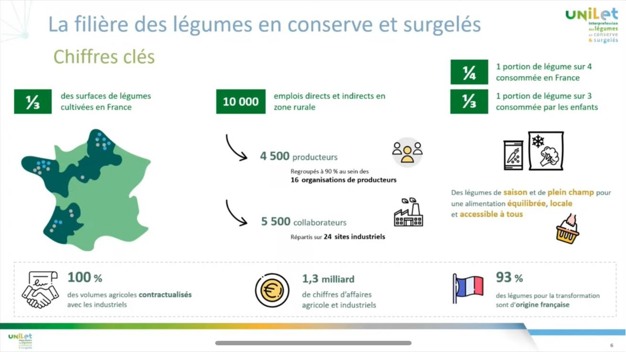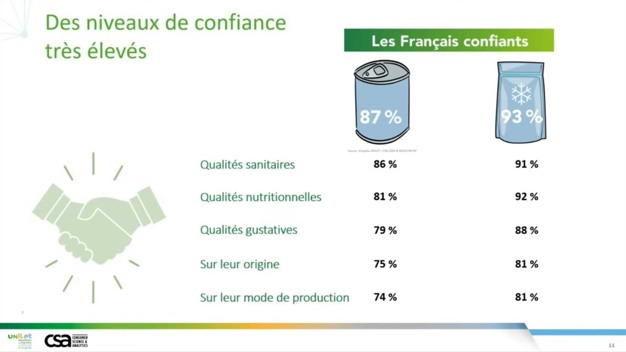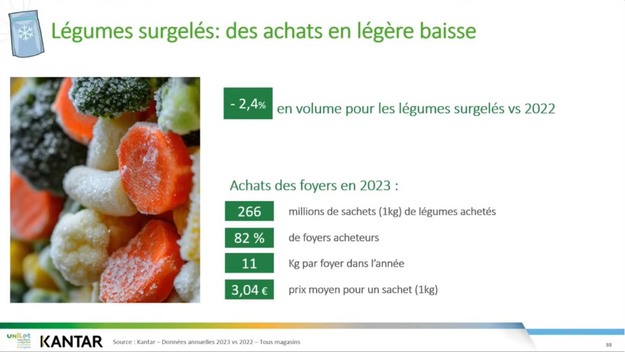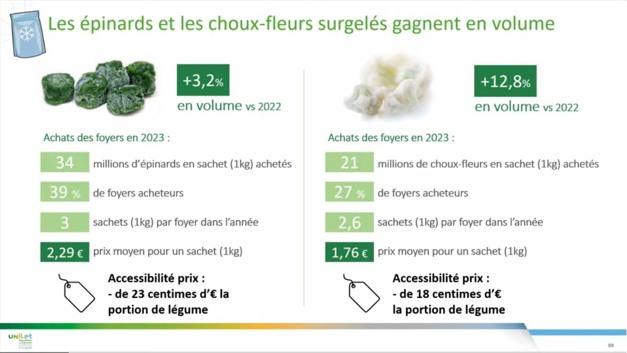At a press conference on June 14th, UNILET, the French canned and frozen vegetables interprofession, presented the latest market figures for the sector, as well as a survey on their image and consumption among the French.

Canned and frozen vegetables "enjoy a good image"
Availability, accessibility, convenience. Canned and frozen vegetables enjoy a good image and are gaining in popularity among the French. These are the findings of a survey conducted by the CSA Institute between April 29th and May 6th, 2024. In a market largely dominated by home consumption (87% for canned and 54% for frozen vegetables), both segments are present in almost every household in France. "90% of French people claim to consume these product categories, and almost 2 out of 3 households consume them almost weekly. At least once a week, 62% of the population (+7 points) eats canned vegetables and 56% consumes frozen vegetables (+3 points)."
Why are canned and frozen vegetables so appealing?
Because of their convenience of consumption and practicality of storage. "They are easy to store, and ready to use, which are two very important criteria according to the survey," explains Cyrille Auguste, president of UNILET. "Their availability throughout the year is another advantage."

This category enjoys "high levels of confidence" thanks to their health and nutritional qualities. "98% of these products, whether in the canned or frozen segment, have a Nutriscore A or B, and 7 products have it displayed," explains the president of the interprofession.

But canned and frozen vegetables suffer from preconceived ideas. 70% of the French are convinced that preservatives are present in canned food, and 51% in frozen vegetables. "Of course, this is completely false, since the principle is to achieve this preservation through appertization (heat treatment in a hermetically sealed environment for canned products) and cold for deep-frozen products," explains Cyrille Auguste, who calls for better communication with consumers.
Sales of canned and frozen vegetables are down, in line with the produce market trend
Despite this good image and growing popularity, the figures show a very slight downward trend in 2023 (-3% in volume for canned and -2.4% for frozen vegetables). For Nicolas Facon, vice-president of UNILET and chairman of FIAC's vegetable group, this "slightly downward trend reflects the general trend on the produce market."


However, several references stand out. This is the case of canned peas and carrots, with higher volumes (+1.3% from last year), the 2nd most purchased reference in the canned segment. The product's appeal is due to its "highly affordable price." In the frozen vegetable segment, spinach and cauliflower sales have gone up.

"Crops have suffered from repeated weather hazards"
"Surface areas have increased overall for the past 7 years, while volumes have generally decreased. Due to repeated weather hazards, we have to plant more to obtain the same volumes, or even a little less. With wide variations in temperature, rainfall, drought and heatwaves that affect our highly sensitive vegetable crops, we are not always able to meet our volumes, which also has an impact on the quality of the vegetables harvested." In 2022, crops suffered a 6% loss in production due to the drought, but in 2023, "the conditions were more normal and more favorable to production, despite the heatwave in June, which had a slight impact on the pea and green bean crops." In 2023, 862,000 tons of vegetables were harvested (40% for canning and 60% for freezing), which was 7% more than in 2022.
This year was marked by very heavy rainfall, leading to delays in planting. "However, it is still too early to say what the consequences might be," warns Jean-Claude Orhan, vice-president of UNILET and president of Cénaldi.
